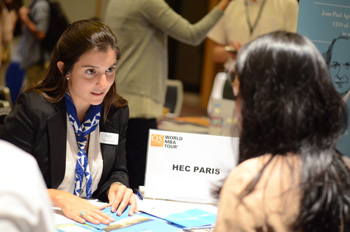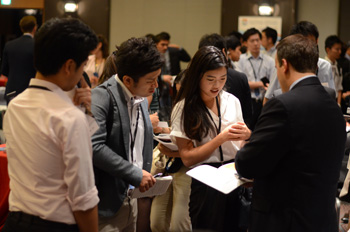|
August 21, 2017
MBA provides better salaries, opportunities
Last year, QS reported a rise in MBA opportunities for aspiring business professionals in Japan. This year, the compilers of the QS World University Rankings find that those with an MBA qualification are now likely to enjoy substantial year-on-year salary increases.

MBA program representatives provide information to those who are thinking of taking an MBA course during the annual QS World MBA Tour that takes place in various world cities. QS
Employers seeking graduates with an MBA in Japan are increasingly prepared to offer higher salaries to those potential hires, defying reported overall compensation trends in the Asia-Pacific region as a whole. Across the entire region, average compensation has decreased year-on-year from $95,200 to $90,300. However, demand for MBA graduates in Japan has continued unabated and QS's recent findings suggest that Japanese employers are inclined to offer more generous salary packages as a consequence.
The 2015-16 edition of the "QS TopMBA.com Jobs & Salary Trends Report" indicated that graduates holding an MBA qualification could anticipate a salary of $46,900 and bonuses of $18,300, for an average cumulative remuneration of $65,200.
However, the 2016-17 edition of the same report shows a considerable rise in both salaries for MBA professionals in Japan, as well as increased bonus-related compensation. The average salary for an MBA graduate in Japan now stands at $60,000, while bonuses have risen at above-inflation rates to $20,000. In total, those with an MBA seeking to start their career in Japan can now look forward to an average of $80,000 per year for their expertise and contributions.
Those considering studying for an MBA are not only likely to see an increased return on their investment. They are also able to undertake their MBA journey in the knowledge that they are increasingly likely to be employed. Asia-Pacific employer respondents in the country predict a 13 percent rise in new opportunities across the 2016-17 period as a whole.
Japanese MBA graduates are not, therefore, the only individuals able to look forward to increased employment opportunities. The Asia-Pacific MBA job market has experienced double-digit growth for a number of years now, and this year's forecast is no exception to that promising trend. Though Japanese MBA market growth figures do not match the increases in demand reported in China and India — the fastest-growing markets — the trends are still propitious for the nation's business students.
Salaries increasing again
In terms of the salary levels MBA graduates might expect from employers in the Asia-Pacific, QS's research illuminates considerable variance at the country level. MBA graduates in Australia currently receive an average of $122,950 per year for their expertise, while Chinese MBA graduates, despite the aforementioned market expansion, will receive a much lower level of compensation, receiving less than $77,000.
Of course, one must factor different costs of living into this equation, while keeping in mind that the self-selecting nature of the survey means that we must read such figures as illustrative rather than precise. Japan compensation levels, despite an increase, are still at the lower end of this spectrum, falling below Singapore, Malaysia, and those on offer in Latin American nations such as Peru and Colombia. However, recent economic trends in Japan — with the economy posting its longest expansion in over a decade — will provide optimism that wages across all sectors will continue to increase.
International comparisons
QS's research shows that, despite the increases in average base salary level in the Asia-Pacific region over the past year, the region's compensation levels have not moved much closer to those on offer in the mature MBA markets of North America and Western Europe. This is, in part, because of the continuing variance we see in what's on offer between individual countries in the region and, of course, the relative costs of living to be found there.

Those with an MBA qualification are likely to enjoy substantial year-on-year salary increases. QS
Sector-by-sector analysis Overall, the MBA continues to prove to be a desirable qualification across the entire world — the trends in the Asia-Pacific region are symptomatic of the 13 percent increase in the number of MBA opportunities across the world. However, it is also instructive to break down this figure to view sector-by-sector increases, as well as those by region.
Finance remains the industry with the highest number of hiring opportunities for MBA graduates, with a 16.3 percent market share of recruitment. However, the predominance of finance is being challenged, as the 16.3 percent figure represents a year-on-year decrease of 0.8 percent.
This indicates that the MBA hiring market has diversified year-on-year, with opportunities in other sectors increasing at a faster rate. QS finds that consulting and technology see the greatest growth in MBA demand across 2015-16, an unsurprising finding, given the inexorable rise in the number of technology-based businesses. In fact, technology has been the most consistent area of hiring, in terms of year-on-year growth over the past three years, with a near 20 percent rise in hiring opportunities year-on-year.
The diversity of opportunities for MBA graduates is indicated by the range of sectors that are increasing the number of MBA hires that they are making. Firms that fall under the "other" classification — a classification that is seeing increases in hiring rates — include some of the less traditional avenues of MBA recruitment, such as the public sector, government, nonprofit, and transportation and distribution sectors. This latter category is hiring MBAs at nearly double the rate it was over 2014-15. For those seeking to take an MBA qualification, the future appears to be bright.
Japanese students wishing to meet top-ranked business schools, learn more about the MBA, receive insight into the highly competitive applications process, or get expert advice on how to pass the MBA admissions tests, can do so by attending the QS World MBA Tour event in Tokyo on Aug. 31. The event is free to attend for all of those who pre-register, and will be held at The Westin Tokyo. Representatives from over 30 business schools, including Cornell University and the University of Michigan, will be in attendance. More information can be found at topmba.com/JapanTimes.
Written by Jack Moran, a writer and editor at TopMBA.com.
|